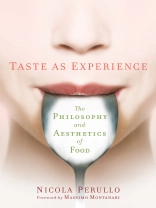Taste as Experience puts the pleasure of food at the center of human experience. It shows how the sense of taste informs our preferences for and relationship to nature, pushes us toward ethical practices of consumption, and impresses upon us the importance of aesthetics. Eating is often dismissed as a necessary aspect of survival, and our personal enjoyment of food is considered a quirk. Nicola Perullo sees food as the only portion of the world we take in on a daily basis, constituting our first and most significant encounter with the earth.
Perullo has long observed people’s food practices and has listened to their food experiences. He draws on years of research to explain the complex meanings behind our food choices and the thinking that accompanies our gustatory actions. He also considers our indifference toward food as a force influencing us as much as engagement. For Perullo, taste is value and wisdom. It cannot be reduced to mere chemical or cultural factors but embodies the quality and quantity of our earthly experience.
Mục lục
Preface to the American Edition
Foreword, by Massimo Montanari
Introduction
First Mode of Access: Pleasure
Second Mode of Access: Knowledge
Third Mode of Access: Indifference
The Wisdom of Taste, the Taste of Wisdom
Notes
References
Index
Giới thiệu về tác giả
Nicola Perullo is professor of aesthetics at the University of Gastronomic Sciences in Pollenzo, Italy. He is the author of several books in Italian and teaches courses on aesthetics and the philosophy of taste, wine evaluation, and the ethics and aesthetics of food.Massimo Montanari is professor of medieval history and the history of food at the Institute of Paleography and Medieval Studies, University of Bologna. His Columbia University Press books include Let the Meatballs Rest: And Other Stories About Food and Culture (2012); Cheese, Pears, and History in a Proverb (2010); Food Is Culture (2006); Italian Cuisine: A Cultural History (2003); and Food: A Culinary History (1999).












